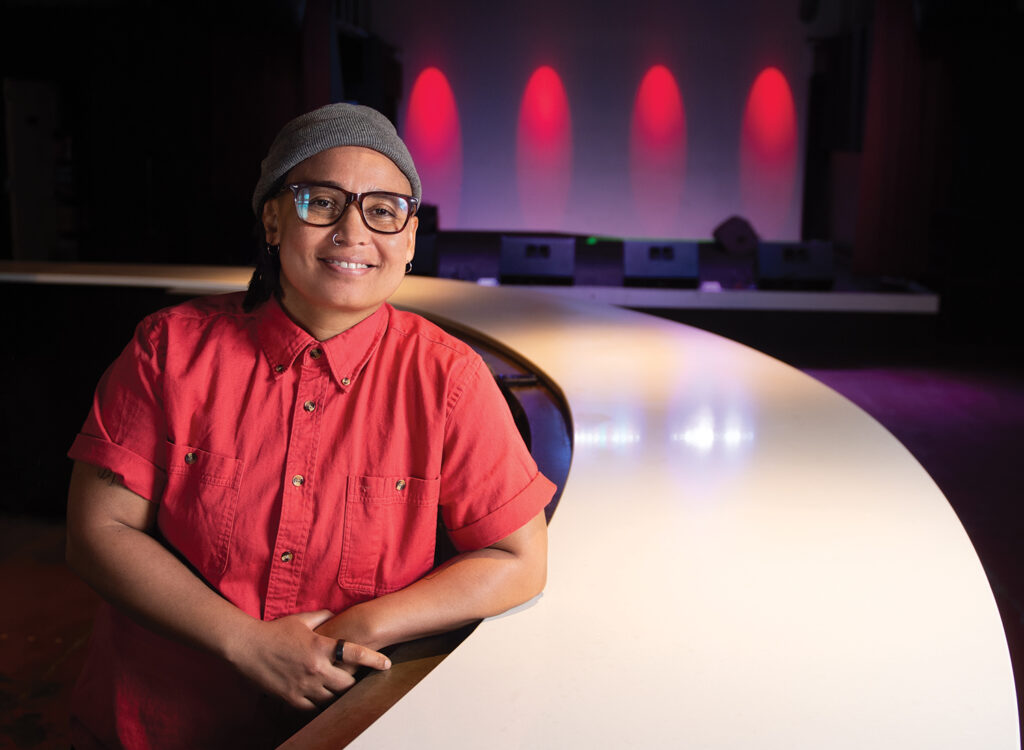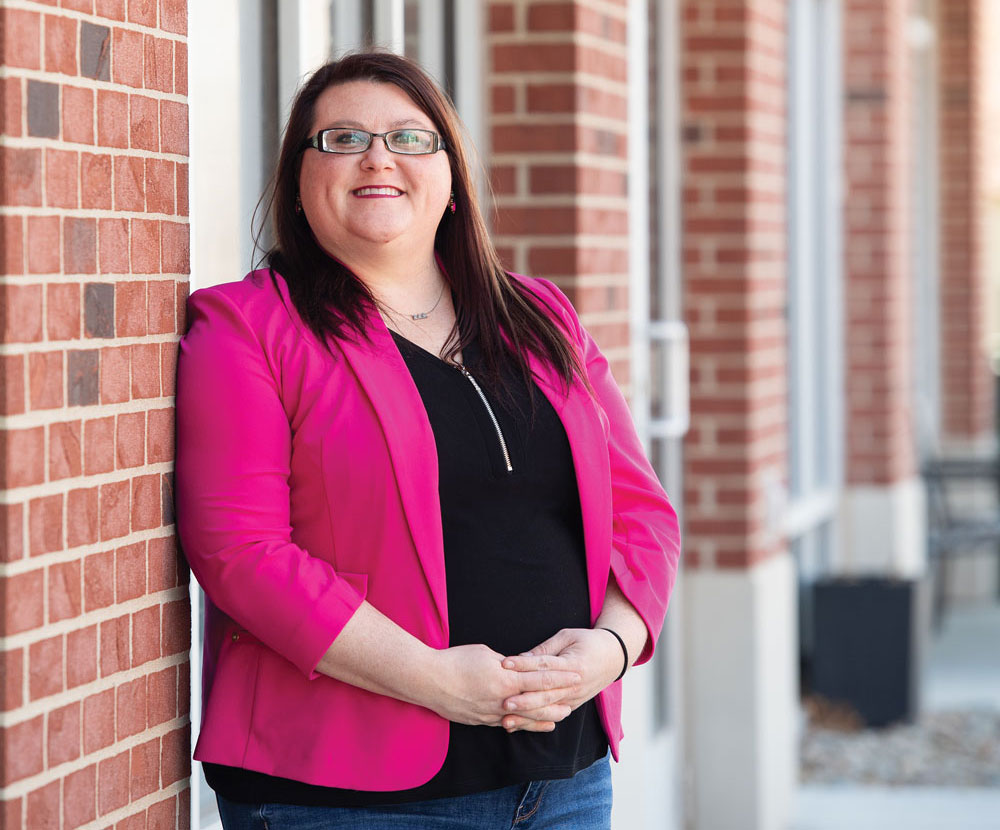A Closer Look: Candi Karsjens
Director, North Iowa Area Community College John Pappajohn Entrepreneurial Center

SARAH BOGAARDS Jul 5, 2022 | 8:15 pm
7 min read time
1,615 wordsA Closer Look, Business Record Insider, Education
For Candi Karsjens, running lemonade stands and selling Girl Scout cookies while growing up in Mason City weren’t just fun childhood activities but also her earliest memories of being entrepreneurial.
She didn’t know then that it would lead to starting and selling two businesses and now serving as director of the John Pappajohn Entrepreneurial Center at North Iowa Area Community College, where Karsjens first went to college. She succeeded Tim Putnam after his departure in December 2021.
The NIACC JPEC is one of five entrepreneurial educational and resource centers that were imagined and first funded by John Pappajohn, founder of Equity Dynamics and venture capital firm Pappajohn Capital Resources. The center at NIACC serves nine counties in northern Iowa, bringing mentoring, programs and financial resources to Main Street businesses and startups in the region.
After selling her second business, a soy candle line called Uncorked that gained national and international wholesale clients, in 2017 Karsjens went back to pharmaceutical sales, the field where she started her career. She knew the work well but was working from home and felt “a disconnect” from the community after her first stint traveling for pharmaceutical sales and being a business consultant with clients outside of Iowa.
“I really wanted to be able to give back with the skills and abilities and knowledge that I had to people in my own area,” she said.
She took the role of director of innovation and acceleration at the JPEC in 2019 and took the lead on the center’s mentorship programming including the NIACC cohort of the University of Iowa Venture School program and being the director of the Pappajohn Center Venture Mentoring Service program, which is based on the Venture Mentoring Service at the Massachusetts Institute of Technology.
The Business Record recently caught up with Karsjens to discuss her new role.
Other than lemonade stands, how did you get on the entrepreneurial track?
I think even before owning our own business, one of the things that was so unique about working in pharmaceutical sales is because we had to come up with our own plans of actions and run our territory as if it was our own business. It was kind of my first exposure within the boundaries of what they let you do [and] what you’re allowed to do. Take your plan of action and work those quarterly, and I had a team, so you know, it was really the entrepreneurial mindset.
How does the NIACC JPEC work with the North Iowa Area Small Business Development Center?
We are integrated with the SBDC, where other Pappajohn Centers work with the SBDCs but aren’t necessarily integrated. It’s been really great to be able to combine the SBDC resources, the Pappajohn center resources. We have a bench with a lot of depth, so we can help a lot of people. The Pappajohn centers stay very connected across the state and we work really hard whether it’s a retail business or the next ag technology because we have that and everything in between. Doing that, we have a lot more depth in the resources that we have. We use a lot of mentors in different capacities — that was one of the first things I did when I came here was build our mentor program. We really think it’s that lean startup approach, plus adding in the mentorship and our integrated office with the SBDC, is what really helps elevate us. We’re the smallest of all the centers. We’re the only one out of community college, so we do a lot more economic development than we do work with students because we only have them for two years, so it limits our time.
Can you explain how the lean startup model used in the University of Iowa Venture School cohorts works?
It’s really a combination of Steve Blank (an American entrepreneur), his lean startup model, and Alexander Osterwalder (a Swiss business theorist) and the business model canvas. It takes those two and puts them together so that you’re going to build your foundational business model. You’re going to write down your hypotheses — what you think customers want, need and will pay for. And then you’re going to do a lot of discovery in a seven-week time frame going out and talking to people about what they do want [and] need and what they have paid for in the past. It’s not always a solution [to a problem], a lot of times it’s a problem like Airbnb. There wasn’t really a problem that there weren’t enough hotels, but it wasn’t necessarily what people wanted. So they found out what people wanted and then you end up designing your business model based on the feedback you get from those early interviews.
How do the NIACC JPEC and the SBDC apply their combined resources to the variety of businesses in north Iowa?
All of us that work with clients are actually trained SBDC counselors, so we can all work with anyone and use their reporting system and their resources too. But for the most part, our SBDC director works with retail and Main Street businesses, has office hours in several of the rural areas. The new innovation and acceleration is not a physical space like an incubator or an accelerator as much as it is finding mentors, finding actual acceleration programs and finding capital. Because in the rural areas, even in Iowa in general, finding venture capital, especially for the more innovative, high-risk business ideas, we really lack venture capital overall in the Midwest. … It’s our job to help entrepreneurs connect with all the resources we have in Iowa. Between the Pappajohn Centers, some of the other resources we have are Iowa Startup Accelerator. There are a lot of accelerators out of Des Moines, so our job on the Pappajohn side is to network with all of those people so we understand the resources that are available and we know who to send where.
What is the NIACC JPEC’s approach to helping entrepreneurs with funding and venture capital needs?
We just lack that big infusion of venture capital, so we may get creative sometimes. We do a lot of contest prep. We work really hard to prep business owners because $5,000 and $10,000 to a really early-stage business can mean a lot and it can get them the visibility they need to get to the $25,000 or $50,000. We’re in the grassroots trying to get them to the next levels and meet the right people and get the right training. We’ve worked really closely with Iowa Startup Accelerator and ISA Ventures, and we’re working on becoming a satellite office for them and their accelerator program and help them find more contributors, more investors. The other way is we work with people. We connect people with mentors to work on that friends-and-family initial-stage funding. Most people use their credit card or get money from friends and family, so if they’re going to do that, we want to just set the friends and family expectations and paperwork up right in the beginning. We try to make the bootstrapping easier so they can get to where a venture capitalist will actually take notice or they’re ready to present.
What is your overall vision for the NIACC JPEC as director?
I’m the fifth director. Some of the programming has changed and the people have changed, but the goal of growing successful businesses in northern Iowa hasn’t changed. For me, it’s not recreating the wheel, it’s being able to expand on the foundation that was already created. So expanding our venture mentor services program, we are in a pilot there. We’ve got a pilot going with an innovation workspace, which is similar to a digital fabrication lab, and we’ve had several entrepreneurs use that space to prototype their ideas, and so they get a working model. The goal is taking those two programs out of pilots and into full-blown functional and sustainable programs. During COVID we had to learn to use the virtual tools and we found that with our large geography, we can get more people into our programs from around our geography because they don’t have to drive. We’re working with new partners, especially in the area of diversity, equity, inclusiveness. We’ve got some partners in different counties where they have more Spanish-speaking populations. We have a really good foundation; it’s just continuing to expand and reach. I like to say refine and align.
How have perceptions of entrepreneurship in rural areas changed, in your experience?
In general, the attitude for a long time, just overall attitude [but] not from one specific group, was that we’re not big enough. We can’t create that here. Technology and the internet and e-commerce and all these things have given people the ability to start a business from anywhere. It’s really given rural area entrepreneurs a more level playing field. It was before I got here, but a gentleman selling kaleidoscopes in this little town of Manly, Iowa, that’s about 5,000 people, there were so few people who sold what he had that with a good e-commerce platform and a good website, he’s one of the most well-known kaleidoscope companies in the country. People think they can only be small because we’re in a small area, but we’re connected to the world with technology now. So it’s kind of overcoming that thought process that we can’t grow that big because of where we live, because you can grow anything big living here. We have land labor and some capital. It’s really getting people to overcome that attitude that they have to live in a big city to create something.










